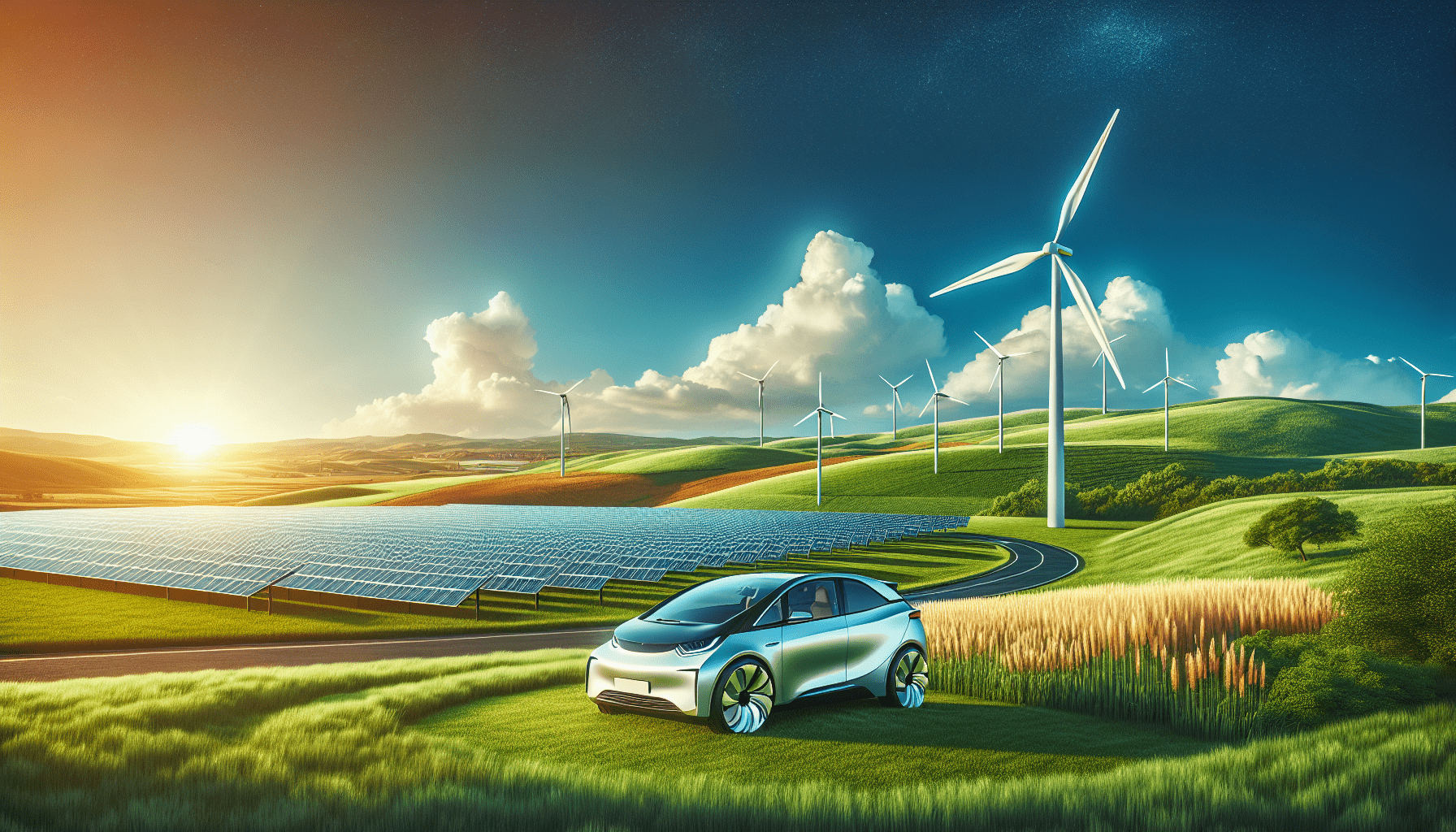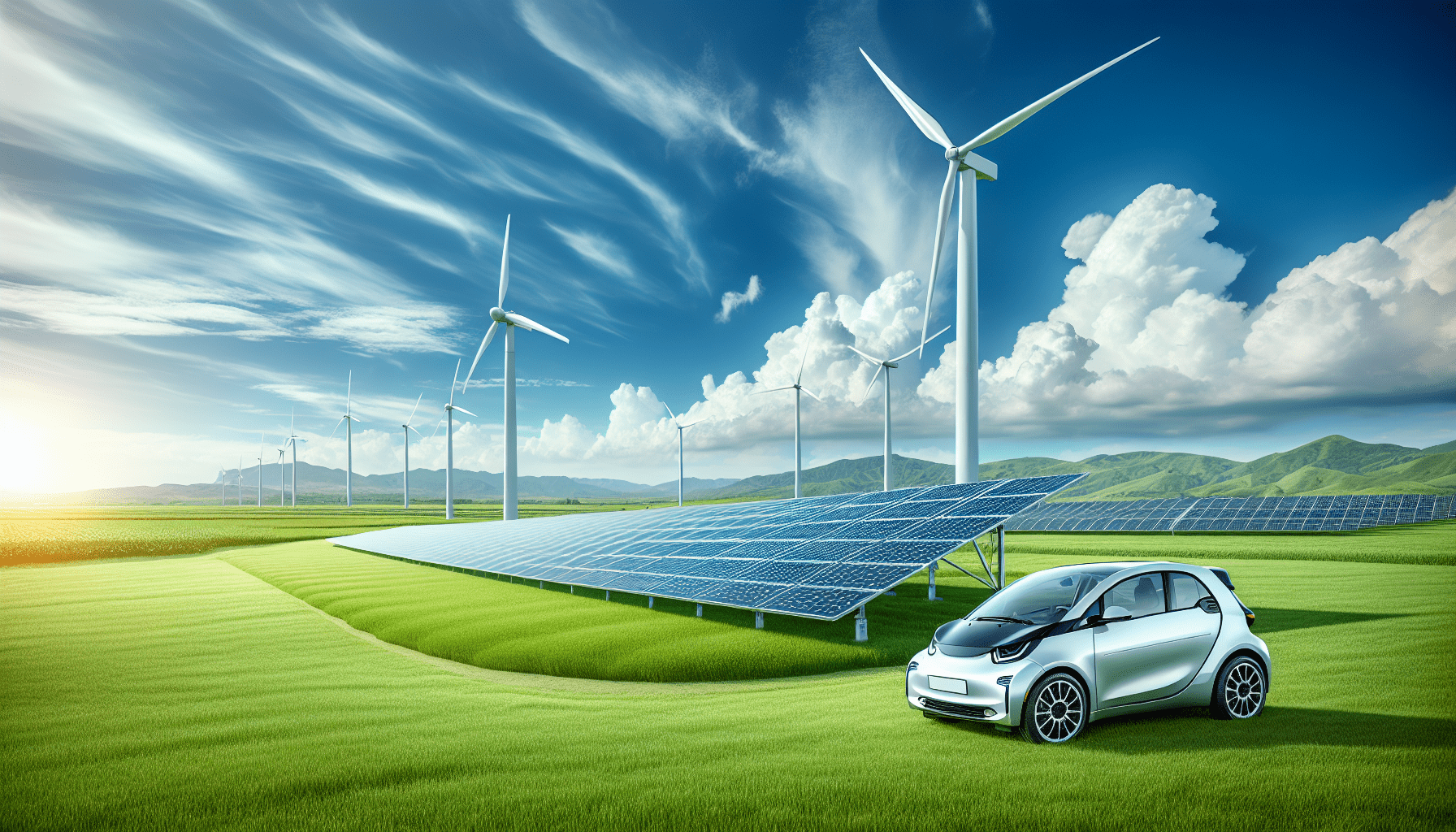Welcome to our deep dive into the fascinating world of sustainable technology! In this article, we will explore the most recent advancements that are making waves in the industry. From groundbreaking renewable energy solutions to cutting-edge waste management techniques, we’ll uncover the innovations that are paving the way for a more sustainable future. Join us as we highlight the incredible progress being made and the visionary minds behind these transformative technologies.
We’ve seen some truly exciting innovations in sustainable technology recently. One standout is the development of solar panels with enhanced efficiency, capturing more sunlight and converting it into energy more effectively. Another game-changer is the rise of green hydrogen, produced using renewable energy sources, offering a clean alternative to fossil fuels. In addition, smart grids are revolutionizing energy distribution, reducing waste, and optimizing efficiency. These advancements, along with breakthroughs in recycling processes and sustainable agriculture, are not only reducing our environmental footprint but also inspiring a global shift towards a more sustainable way of life. Have you ever wondered what the latest innovations in sustainable technology are? With the urgent need to address environmental concerns, cutting-edge technologies are continually emerging to help us achieve a more sustainable future. These innovations span various industries, from energy and transportation to agriculture and waste management. Let’s dive into some of the most exciting developments and explore how they are paving the way for a cleaner, greener world.

Renewable Energy Sources
Solar Power Advancements
Solar power is no stranger to sustainability discussions. However, recent advancements have made it more efficient and accessible than ever before. Innovations like perovskite solar cells are revolutionizing the industry. Unlike traditional silicon-based cells, perovskite cells are cheaper to produce and can be applied to flexible surfaces, making them ideal for a broader range of applications.
Moreover, innovations such as solar tree technology and solar roadways are maximizing the utility of solar panels. Solar trees are designed to resemble real trees but are equipped with photovoltaic panels, while solar roadways integrate solar cells into the surface of roads, offering dual functionality.
Wind Energy Innovations
Wind energy has also seen remarkable advancements. The development of offshore wind farms, for instance, has allowed us to harness wind energy more efficiently by tapping into stronger and more consistent wind patterns found over oceans and large bodies of water. Additionally, bladeless wind turbines are emerging as a quieter and safer alternative to traditional wind turbines, reducing the risk to wildlife while delivering energy more efficiently.
Hydropower and Ocean Energy
Hydropower has been a reliable renewable energy source for years, but recent innovations are making it even more sustainable. Run-of-the-river hydroelectric systems, for instance, generate electricity without disrupting the natural flow of rivers, thus minimizing environmental impact.
Furthermore, ocean energy technologies, such as tidal and wave energy converters, capture the kinetic energy of ocean waves and tides to generate electricity. These emerging technologies have the potential to provide a significant portion of our energy needs in the future.
Sustainable Transportation
Electric Vehicles (EVs)
Electric vehicles (EVs) are at the forefront of sustainable transportation. Innovations in battery technology, such as solid-state batteries, are offering longer ranges and shorter charging times, addressing some of the primary concerns consumers have with EVs. Additionally, improvements in charging infrastructure, like ultra-fast chargers, make using EVs more convenient.
Hydrogen Fuel Cells
Hydrogen fuel cell technology is another promising innovation in sustainable transportation. Hydrogen fuel cells combine hydrogen and oxygen to produce electricity, emitting only water vapor as a byproduct. This technology is particularly appealing for heavy-duty vehicles, such as trucks and buses, where battery weight and charging time are critical considerations.
Public Transportation Innovations
Public transportation systems are also becoming more sustainable through innovations like electric buses and trams powered by renewable energy. Autonomous electric shuttles are being tested in various cities to offer an environmentally friendly and efficient mode of transport. Additionally, the development of hyperloop technology has the potential to revolutionize long-distance travel by providing a high-speed, low-energy alternative to traditional trains and airplanes.

Sustainable Agriculture
Vertical Farming
Vertical farming is transforming the way we grow food by utilizing vertical space and controlled environments to cultivate crops. This method significantly reduces the need for arable land and water while eliminating the need for harmful pesticides. By stacking layers of crops and using LED lighting, vertical farms can produce food year-round, regardless of climate conditions.
Precision Agriculture
Precision agriculture leverages technologies like GPS, IoT (Internet of Things), and drones to optimize farming practices. Sensors placed in fields can monitor soil moisture, temperature, and nutrient levels, allowing farmers to apply the right amount of water, fertilizers, and pesticides exactly where and when they are needed. This targeted approach not only increases crop yields but also reduces waste and environmental impact.
Lab-Grown Meat
Lab-grown meat, cultured meat produced from animal cells in a lab setting, offers a sustainable alternative to traditional livestock farming. This innovative technology has the potential to reduce greenhouse gas emissions, save water, and decrease the land required for meat production, while still providing us with the nutritional benefits of conventional meat.
Waste Management and Recycling
Circular Economy
A circular economy is an economic system aimed at eliminating waste and the continual use of resources. This approach contrasts with the traditional linear economy, which has a ‘take, make, dispose’ model of production. The circular economy employs strategies such as recycling, reusing, and refurbishing products to extend their lifecycle. Companies are increasingly adopting this model to minimize waste and make more efficient use of resources.
Advanced Recycling Technologies
Traditional recycling methods often fail to handle complex and mixed-material products. Advanced recycling technologies like chemical recycling break down plastics into their basic chemical components, which can then be reused to create new materials. This process not only increases the types and amounts of materials that can be recycled but also produces higher-quality recycled products.
Waste-to-Energy Technologies
Waste-to-energy (WTE) technologies convert waste materials into usable energy forms like electricity, heat, or fuel. Innovations in this area include advanced thermal treatments like pyrolysis and gasification, which offer cleaner and more efficient ways to transform waste into energy. Additionally, anaerobic digestion converts organic waste into biogas, providing a renewable energy source while reducing landfill waste.

Sustainable Water Management
Desalination Technologies
Desalination technologies are essential for providing fresh water in areas where natural freshwater resources are scarce. Recent advancements in desalination, such as reverse osmosis and forward osmosis, have made the process more energy-efficient and cost-effective. Emerging technologies like solar desalination are particularly promising, offering a sustainable way to harness renewable energy for water purification.
Water Recycling and Reuse
Water recycling and reuse technologies treat wastewater to make it safe for reuse in various applications, from agricultural irrigation to industrial processes and even potable water. Innovations such as membrane bioreactors and advanced oxidation processes are enhancing the efficiency and effectiveness of wastewater treatment, making it a viable solution for addressing water scarcity.
Smart Water Management Systems
Smart water management systems utilize IoT sensors and data analytics to monitor and optimize water usage. These systems can detect leaks, measure water quality, and provide real-time data to help utilities manage water resources more effectively. By improving water distribution and reducing losses, smart water management systems play a crucial role in ensuring sustainable water use.
Green Building Technologies
Energy-Efficient Building Materials
Innovations in building materials are significantly enhancing the energy efficiency of structures. Materials like insulated concrete forms (ICFs) and structural insulated panels (SIPs) provide excellent thermal insulation, reducing the energy required for heating and cooling. Additionally, advanced glazing technologies, such as electrochromic windows, can adjust their transparency to regulate indoor temperatures and lighting.
Sustainable Construction Practices
Sustainable construction practices focus on minimizing environmental impact throughout the building lifecycle. Techniques such as modular construction, which involves prefabricating building components off-site, reduce waste and improve construction efficiency. Additionally, green roofs and living walls incorporate vegetation into building designs, providing natural insulation, reducing urban heat islands, and improving air quality.
Net-Zero and Passive House Standards
Net-zero buildings generate as much energy as they consume, often through a combination of renewable energy systems and energy-efficient designs. Similarly, Passive House standards emphasize rigorous energy efficiency and airtight construction to minimize energy use. By adopting these standards, we can significantly reduce the carbon footprint of our built environment while providing comfortable and healthy living spaces.

Sustainable Lifestyles and Consumer Choices
Eco-Friendly Products
Eco-friendly products are designed with sustainability in mind, often utilizing renewable materials or adopting low-impact manufacturing processes. From biodegradable packaging to energy-efficient appliances, these products enable us to make more environmentally conscious choices in our daily lives. Companies are increasingly recognizing the demand for sustainable products, leading to a wider range of options for consumers.
Minimalism and Zero-Waste Living
Minimalism and zero-waste living are lifestyle choices that emphasize reducing consumption and waste. Minimalism encourages us to focus on owning fewer, high-quality items that serve multiple purposes. Meanwhile, zero-waste living aims to minimize the amount of waste we produce by adopting practices like composting, recycling, and using reusable items. These lifestyles not only reduce our environmental impact but also promote mindfulness and simplicity.
Sustainable Fashion
Sustainable fashion seeks to address the environmental and social impacts of the fashion industry. Innovations in this field include upcycling, where old materials are transformed into new garments, and the use of sustainable fabrics like organic cotton, bamboo, and recycled polyester. Additionally, initiatives like clothing rental services and second-hand shopping platforms are gaining popularity, promoting a circular approach to fashion consumption.
Government Policies and Corporate Initiatives
Environmental Regulations
Governments around the world are implementing environmental regulations to drive the adoption of sustainable technologies. Policies like carbon pricing, renewable energy mandates, and fuel efficiency standards incentivize businesses and individuals to reduce their environmental footprint. By setting clear targets and providing financial incentives, these regulations help accelerate the transition to a sustainable future.
Corporate Sustainability Programs
Many companies are adopting sustainability programs to reduce their environmental impact and meet the growing demand for eco-friendly products and practices. These programs often involve setting ambitious goals, such as achieving net-zero emissions, reducing waste, or sourcing materials sustainably. Additionally, companies are increasingly incorporating sustainability into their corporate social responsibility (CSR) initiatives, demonstrating their commitment to environmental stewardship.
Public-Private Partnerships
Public-private partnerships (PPPs) are collaborative efforts between governments and private sector entities to address sustainability challenges. These partnerships leverage the strengths of both sectors, combining public resources and regulatory support with private innovation and investment. PPPs have been instrumental in advancing sustainable technologies, from funding research and development to deploying large-scale renewable energy projects.

Educational and Community Initiatives
Sustainability Education
Sustainability education equips individuals with the knowledge and skills needed to promote sustainable practices in their personal and professional lives. Educational institutions are increasingly incorporating sustainability into their curricula, offering courses and degree programs focused on environmental science, renewable energy, and sustainable business practices. Additionally, community workshops and online resources provide accessible learning opportunities for people of all ages.
Community-Led Initiatives
Community-led initiatives play a vital role in advancing sustainability at the local level. These initiatives often involve grassroots efforts to promote recycling, composting, and energy conservation within neighborhoods. Examples include community gardens, which provide fresh produce and green spaces, and local clean-up events, which help reduce litter and pollution. By fostering a sense of collective responsibility, community-led initiatives empower individuals to take meaningful action toward sustainability.
Advocacy and Awareness Campaigns
Advocacy and awareness campaigns raise public consciousness about environmental issues and encourage sustainable behavior. Environmental organizations, activists, and influencers use various platforms, from social media to public demonstrations, to highlight the importance of sustainability and mobilize action. These campaigns often focus on pressing issues, such as plastic pollution, climate change, and deforestation, inspiring people to make positive changes in their lives.
Technological Research and Development
Innovation Hubs and Incubators
Innovation hubs and incubators are dedicated spaces where entrepreneurs and researchers can develop and test new sustainable technologies. These centers provide resources, mentorship, and funding to support early-stage projects and accelerate their commercialization. By fostering a culture of innovation and collaboration, these hubs play a critical role in advancing sustainable solutions.
Cross-Disciplinary Collaboration
Sustainability challenges often require solutions that span multiple disciplines. Cross-disciplinary collaboration brings together experts from diverse fields, such as engineering, biology, and social sciences, to tackle complex problems. By leveraging different perspectives and expertise, collaborative efforts can lead to more innovative and effective sustainable technologies.
Continuous Improvement
Continuous improvement is a key principle in the field of sustainable technology. As new challenges and opportunities arise, ongoing research and development are essential to refining existing technologies and discovering new solutions. This iterative process ensures that sustainable technologies remain effective and relevant in addressing our evolving environmental needs.
The Future of Sustainable Technology
Emerging Trends
The future of sustainable technology holds exciting possibilities. Emerging trends like artificial intelligence (AI) and blockchain are being integrated into sustainability efforts, providing new tools for optimizing resource use and enhancing transparency. AI can analyze vast amounts of data to improve energy efficiency and predict environmental impacts, while blockchain can track the lifecycle of products to ensure ethical sourcing and reduce waste.
Global Collaboration
Global collaboration is crucial for addressing environmental challenges that transcend borders. International agreements like the Paris Agreement on climate change set the stage for coordinated efforts to reduce greenhouse gas emissions and promote sustainable development. By working together, countries can share knowledge, resources, and best practices to amplify the impact of their sustainability initiatives.
Individual Impact
While technological advancements play a significant role in promoting sustainability, individual actions are equally important. By making conscious choices, such as reducing energy consumption, minimizing waste, and supporting sustainable products, we can collectively drive the demand for sustainable technologies and practices. Every small action contributes to a larger movement toward a sustainable future.
Let’s summarize our journey.
Conclusion
As we have explored, the latest innovations in sustainable technology are making significant strides across various industries. Renewable energy sources like solar, wind, and hydropower are becoming more efficient and accessible, while sustainable transportation options, such as electric and hydrogen fuel cell vehicles, are transforming how we travel. Advances in agriculture, waste management, water conservation, and green building are further contributing to a more sustainable world.
Moreover, the efforts of governments, corporations, communities, and individuals are essential for driving the adoption of these technologies. By staying informed and making conscious choices, we can all play a part in advancing sustainability and ensuring a healthier planet for future generations.
Our commitment to sustainability is not just a choice but a necessity. The journey is ongoing, and the innovations we embrace today will shape the future we create for ourselves and the generations to come. Now, let’s continue to explore, innovate, and act for a sustainable tomorrow.



